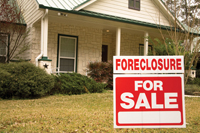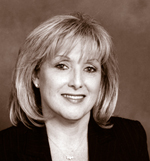Prime Aid, Subprime Crisis

Photo by iStockPhoto.com
With hundreds of thousands of cash-poor homeowners facing foreclosure, America’s pro bono forces are riding to the rescue—despite a major ethics hurdle.
That hurdle is “issue conflict”—the potential conflict of interest for any law firm that has lawyers representing banks, savings and loans, and other financial institutions.
But the need—arising from the subprime mortgage debacle and exacerbated by skyrocketing food and fuel costs as well as rising layoffs—is great. Mark Schickman, a partner at Freeland Cooper & Foreman in San Francisco who chairs the ABA’s Standing Committee on Pro Bono and Public Service, says one in every 160 homes is subject to foreclosure.
“It’s almost a losing battle trying to provide legal services to the poor,” he says. “Every time we think we’re making headway, something like the foreclosure crisis comes in and pushes us from the goal. Pro bono attorneys are coming out in droves for this. It’s really heartening.”
ETHICAL OK
In April, the Association of the Bar of the City of New York’s standing Committee on Professional and Judicial Ethics issued an informal opinion (PDF) regarding homeowner representation by firms that represent financial institutions.
The bar found there was a potential for a conflict of interest, but that it could be handled either by referral or waiver. In the first instance, a lawyer or firm can refer a case to competent counsel if the case involves a specific client.
In other instances, lawyers and their firms exclusively represent financial institutions and must seek a waiver from their clients before proceeding on a nonrelated case to help a homeowner. This waiver would be for limited representation.
Effectively, the lawyer working a given foreclosure case would create an ethical wall between herself and the other attorneys in the firm handling other cases with the financial institution. And she would refrain from using any information gleaned about the institution from previous cases handled by the firm.
The Federal Reserve Bank of New York and the City Bar Justice Center are sponsoring a pro bono legal services effort called the Lawyers’ Foreclosure Intervention Network that pairs homeowners at risk of foreclosure with attorneys and certified law students.
Kathleen McLeroy, a partner at Carlton Fields in Tampa, Fla., and vice-chair of the Pro Bono Committee of the ABA’s Business Law Section, is looking into obtaining a similar ethics ruling from the Florida bar. “Even if you don’t represent a particular lender,” McLeroy says, “if you are going to attack standardized practices it becomes a problem because it could affect your client by establishing new case law.”

Kathleen McLeroy
According to McLeroy, there’s a tremendous need for pro bono attorneys to help homeowners in her state.
“I think there are a lot of people going lawyerless,” she says. “A lot of people are just being defaulted in court. Once they get the foreclosure notice they try to stay in the home.”
At the end of June, the Florida Bar inaugurated a hotline for homeowners facing foreclosure. The hotline is part of a program called FLASH, for Florida Attorneys Saving Homes, which is headed by the state bar’s Real Property, Probate and Trust Law Section.
“We don’t have any ending date for this,” says Alice Vickers, a staff attorney at Florida Legal Services in Tallahassee, which will also be assisting with homeowner questions. “We view it like the project we did a couple of years ago after the hurricanes, the Disaster Project. It will continue as long as the need is there.”
In Chicago, when Sandra Bijou’s ceiling started to leak, replacing it almost caused her to lose the roof over her head. Since she is on a fixed income, the added expense pushed her into foreclosure proceedings. But a new affordability gap loan program administered by the Northwest Side Housing Center came to her aid.

John Hitt
Several major banks and lawyers from the Chicago office of the financial services law firm of Chapman and Cutler ironed out the financial and legal aspects of the loan. They are working together to stem the onslaught of more than 1,700 home foreclosures in the area since last year. “Absolutely, people could take this program and do it elsewhere,” says John Hitt, the Chapman and Cutler partner who helped arrange Bijou’s loan.
Bijou, for one, had a limited, fixed income and a predatory subprime mortgage.
“This is a whole new class of pro bono clients,” Schickman says. “These are people who were on the cusp of experiencing the American dream of homeownership. The subprime foreclosure issue is really going after the first-time homebuyer and people who really thought they were taking a step up. All of a sudden they see the platform cut out from under them. Many of them were not among the ranks of the poor until they fell prey to foreclosure.”
In Philadelphia, Judge Annette Rizzo of the Court of Common Pleas expressed great interest in Chicago’s affordability gap loan program.
Rizzo oversees a judicial initiative called the Mortgage Foreclosure Diversion Pilot Program, which went into action in June. Roughly 6,500 foreclosures were filed last year and another 2,000 are expected this year, Rizzo says. The program seeks to pre-empt foreclosures by helping homeowners before they end up in such proceedings. “Our program is a case management program that can capture these cases early on to try to divert them from sale,” she says. “That’s our mission.”
While the subprime mortgage fiasco is affecting other areas of the country, Philadelphia is a more stable market where the majority of people are in trouble due to a change in circumstance. “These aren’t the $500,000 homes that people just can’t meet the [adjustable rate mortgage],” Rizzo says. “These are people of low income, the working poor.”
MEANS OF AVERTING FORECLOSURE
Before losing one’s home to a foreclosure judgment, the struggling homeowner is encouraged to call the Philadelphia Legal Assistance hotline to set up a meeting with a housing counselor, Rizzo says.
Local attorneys are lining up to help the homeowners on a pro bono basis. They will assist during a court-ordered conference with the lender. The court encourages the parties to sit down and work out a plan, whether it involves reducing interest rates or a lender cutting his losses with a short sale.
The program got a kick-start in April, when Philadelphia Sheriff John Green refused to go forward with a scheduled auction of foreclosed properties. While Green may have been acting like Robin Hood to take from the rich and give to the poor, he had no legal basis to unilaterally cancel the auction—something he had done during a similar crisis four years ago, Rizzo says. While Rizzo opposed a moratorium on sheriff’s sales, she did request guidance from pleas court President Judge C. Darnell Jones.
“I went to the judge and said this might be the time to take affirmative action and divert the homes before they go into foreclosure,” Rizzo says.
Toward that end, Jones approved a plan for the homeowner, the lender and court-appointed counsel to sit down with a judge pro tem (a senior member of the local bar association) to try to work out a deal to divert properties from a sheriff’s sale.
When the Philadelphia bar put the word out that help was needed, 100 lawyers answered the call on a pro bono basis. “I think that’s pretty compelling that they stepped up,” Rizzo says.
Philadelphia Mayor Michael A. Nutter earmarked $2 million for the program in early June to provide for court-appointed attorneys and community outreach to inform the homeowners of the program and in some instances provide them with transportation to court.
Write a letter to the editor, share a story tip or update, or report an error.


